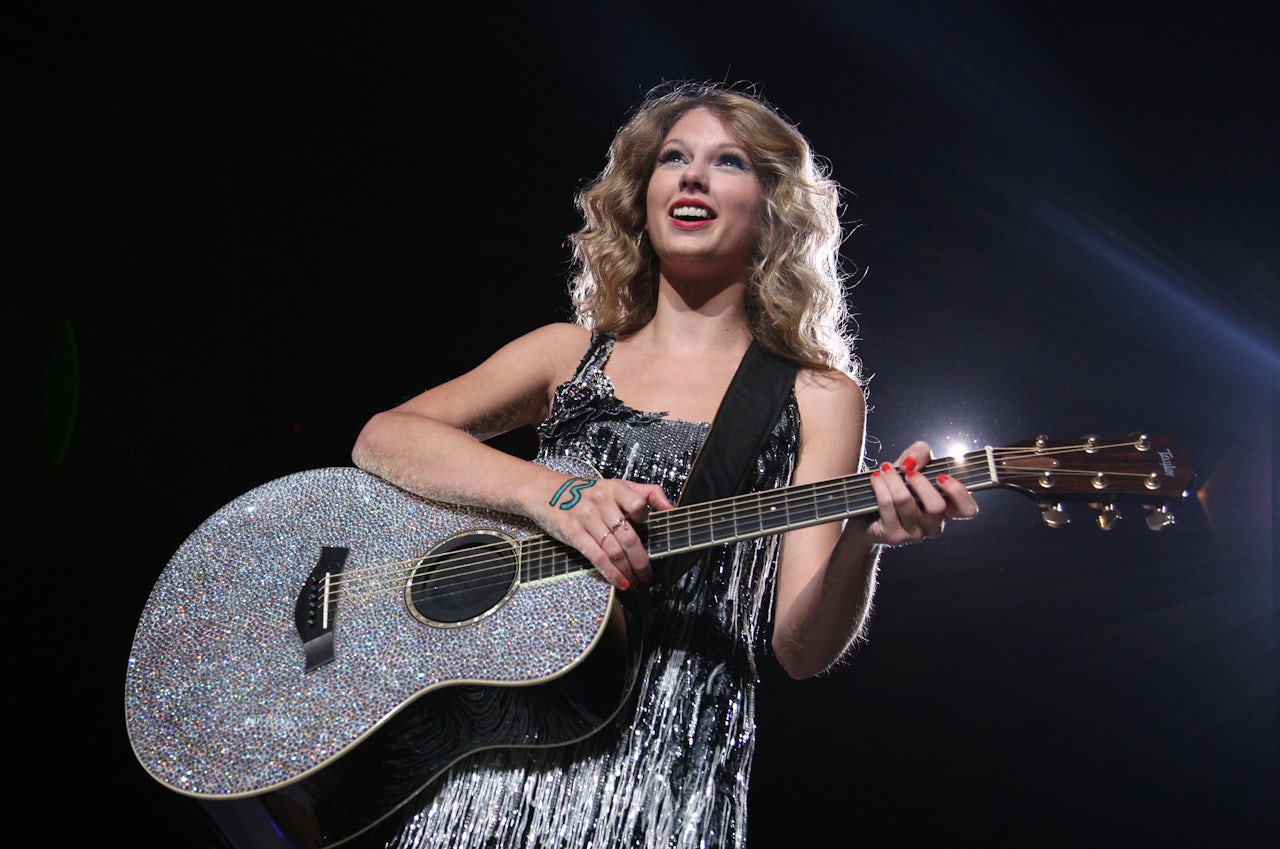Ten years ago, most people didn’t have an opinion about Taylor Swift. Of course, back then Facebook was still mostly used by students, and Twitter was mostly used by Silicon Valley weirdos and Shaquille O’Neal, and neither had become the unbearable engine of opinion they would in 2018, but even so: Most people didn’t have an opinion about Taylor Swift because even though she was popular — having sold millions of copies of her debut self-titled record — she wasn’t mainstream. She was a country star, big on country radio and winner of country awards, but if you didn’t listen to country music, you could be safely ignorant about her whole deal.
Fearless, her sophomore album, changed all of that. It’s still her highest-selling album, having been certified diamond (meaning 10 million copies sold) in 2017, and her first to score a Top 5 Billboard single. Artistically, there’s not much new to say about Fearless, which turns 10 years old on November 11. The album got a handful of fifth-anniversary retrospectives, as well as some appreciations last fall following the release of Reputation, Swift’s latest, markedly worse album. If you like pop-country songs with upbeat melodies and well-sketched feelings, put on the title track and transport yourself to a high-school dance, forever, or feel the exhilarating emotional rush of “You Belong With Me.” It was well-received at the time, though critics tended to condescendingly cast it in the language of, “look at this high school girl being so earnest about her feelings.” (Rolling Stone’s Jody Rosen: “For Fearless to feel any more like it was literally ripped from a suburban girl’s diary, it would have to come with drawings of rainbows and unicorns in the liner notes.”)
But Fearless is interesting because it was the first time Swift took her major themes mainstream, as well as the last time she could present herself as the girl next door, instead of the mega-famous person she was about to become. She hadn’t yet earned a reputation as a serial dater (or as a serial celebrity dater) when she sang about getting unceremoniously dumped by Joe Jonas (who, at the time, was more popular) on “Forever and Always.” Her penchant for casting herself as gleaming, wronged heroine was not as evident when she wrote “Love Story” — which for years was her best-selling single — in which she cast herself both as Juliet Capulet and Hester Prynne. And her perceived ruthlessness in demanding loyalty from her friends was barely a concern when she used her real-life best friend Abigail’s hurt as the emotional grist for “Fifteen,” which is both a savvy read of how one’s feelings seem at that age (“Cause when you’re fifteen / Somebody tells you they love you, you’re gonna believe them”) and a dickish way of putting your BFF’s inner turmoil on blast to the whole world.
In other words: Fearless was the last album Swift released before she was Taylor Swift, a famous person you were legally required to know about who would be constantly involved in incidents betraying the normalcy she purported to embody. Within a year of its release, she’d get upstaged by Kanye West at the MTV Video Music Awards (an incident that continues to bear publicity fruit nearly a decade later), and have a secret, vaguely illicit (their age gap was what!?) relationship with John Mayer, whom she’d later excoriate on the brutal “Dear John.” She’d keep hanging with Abigail, but pick up more famous friends like Karlie Kloss, Selena Gomez, and Lena Dunham. She’d continue shifting her song from country to pop, flirting with dubstep and Max Martin-written hooks on 2012’s Red, before getting rid of her acoustic guitar altogether by 2014’s 1989. She would feud with the Kardashians, as sure a sign as any that you have ascended into the most elite echelon of unrelatable celebrity bullshit.
As of Reputation, Swift transformed entirely into a synth-wielding, black-dressing pop villain, which is as much as an affectation as the golden good girl seen in Fearless. But since Fearless appeared to the pop mainstream seemingly out of nowhere, it wasn’t yet as accepted that Swift was actively manicuring a narrative rather than transcribing her inner life. She was not simply a diaristic songwriter bleeding onto the page, as critics assumed she was, but a savvy wordsmith with clear goals of becoming successful. (Lyrics from “Fifteen”: “Back then I swore I was gonna marry him someday / But I realized some bigger dreams of mine.”) On one level, duh: She was appearing in big-budget music videos and making pop music. But the acoustic guitar and aw shucks routine allowed her to seem authentic, the best thing a pop star (who by nature of their career are not authentic) can appear to be. Once, she could plausibly act surprised when she won an award; now, she sends up that reputation in her music videos.
None of this changes the fact that Fearless is still a great collection of songs, frozen in time as Swift has moved away from that pop-country sound and that naifish point of view. It would certainly sound alien to anyone coming to her for the first time in 2018, though not as alien as her self-titled debut. (A friend, on hearing “Our Song” for the first time: “Oh wow, this is real country.”) Nonetheless, there’s no point in yearning for the past. Reputation may comparatively stink, but it’s who she is as she approaches 30, having long abandoned fantasies of happy endings and clear-eyed Romeos. At this age, following all the success she’s had, the same guileless Fearless schtick would ring undeniably false; her maturation as an artist goes hand-in-hand with her maturation as a celebrity. In retrospect, her sense of self-possession at age 18, when Fearless was released, should’ve instructed everyone about her true intentions. She didn’t plan to be the girl-next-door for long, even if that’s what she told the world.
